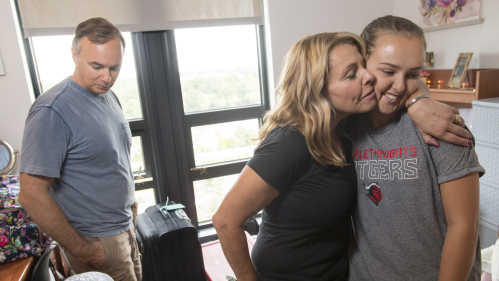Parents, Here's Advice for You and Your Children Heading Off to College

The days of cutting their grapes in half, reading bedtime stories and kissing boo-boos are long gone.
Your college-bound child is no longer, well, a child. Whether or not they are preparing to physically leave your nest, all incoming first-year students are about to embark on the next chapter of their lives largely on their own.
And that transition – from supervised teen to independent adult – can be a stressful one for parents and children alike.
It’s normal for stress and anxiety to arise around this rite of passage, said Stephanie Marcello, assistant vice president of academics, integration and innovation at the Behavioral Research and Training Institute and chief psychologist with Rutgers University Behavioral Health Care and Karen Smith, assistant professor of psychology with Rutgers–Newark. The two mental health experts offer tips to help parents and college-bound children recognize and navigate the stressors associated with starting college so they can maintain healthy relationships.
What is it about the transition to college that can make parents and students feel stressed or anxious? Are there ways to avoid it?
Karen Smith: We often hear about stress negatively in the media, but when you are going through a life transition like this, recognize that stress in and of itself is not a bad thing. Stress is about perceiving a potential threat or challenge, often characterized by high levels of unpredictability or lack of control. That perceived challenge elicits a whole range of biological, physiological and behavioral responses aimed at helping you deal with the stressor and implement strategies for managing it. Problems arise when we try to avoid the perceived threat or withdraw.
What are healthy ways for parents and students to manage their stress around this transition without negatively affecting their relationship?
Karen Smith: Find small ways to try and bring back some control or predictability. For students, learn more about what the college transition looks like so you can establish a routine, choose a meal plan, map out your classes, plan on how to decorate your room. For parents, talk with your child when both of you are calm about what is causing stress and how it shifts your attention to negative thoughts. Even recognizing that can help you break that cycle. Parents, if you are feeling anxious, give yourself time to step away from it. That makes for a more productive conversation.
Sometimes sending a child to college comes with a physical separation and sometimes it does not. How do you give commuting students their space and prevent a physical distance from becoming an emotional one for students living on campus?
Stephanie Marcello: It’s important to have conversations with college students either way. What are the boundaries and the rules whether living at home or on campus? They should be very clear to all involved. Families can sit down and have a conversation about what this next phase looks like. Since they are older, a great first step is to just stop talking and interrupting them while they speak. In turn, ask them to do the same. Sometimes we might notice ourselves trying to put together a comeback while they are still speaking, so we want to be aware of that.
How do you help a homesick student ease their transition to college? How do you keep lines of communication open with a student who begins ghosting you after move-in?
Stephanie Marcello: It’s important that you and your college student establish how much communication works for all of you. One way to keep connected is by following their social media accounts. I would observe, but not be active in posting. I wouldn’t make assumptions. A student may not call or text because they are having a wonderful experience. However, we do want to check-in if we haven’t heard from them. If they are living in a residence hall, you can check with the staff, and they can do a wellness check.
Any tips for parents who miss their children and feel a sense of loss as their student's independence grows?
Stephanie Marcello: First, I want to normalize whatever feelings you are having. This is a huge transition that can be filled with distress, loss, nostalgia. Let yourself feel it. We want to avoid projecting these feelings onto our college students. Typically, within a month or two, you will notice adjusting to this transition. It is time to prioritize yourself again, and that’s okay if you don’t know what that means. Connect with others who have or are going through similar transitions. And remember that secure parental attachment and healthy levels of separation have consistently been linked to greater college student adjustment and strengthens students’ psychological well-being.
Do you have healthy relationship advice for parents who may now find they have much more time together alone and are not as focused on the kids as they were before?
Karen Smith: Your social situation has changed, and that could increase risk of feeling like you are missing a social connection. Loneliness is perceiving yourself to be socially isolated. Recognize you are in a new environment. You are at increased risk for feeling isolated and lonely. Instead of dwelling on that, look at how you can find ways to connect within that new environment – either students going out for new social activities or parents connecting with their partner or other parents.


